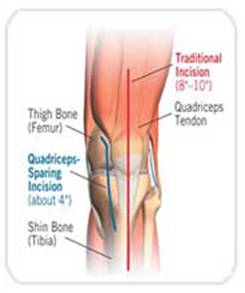- +91 9820036852
- sanjeev.jain@hiranandanihospital.org
- drsanjain@hotmail.com
Minimally Invasive Knee Replacement
Total knee replacement is one of the most commonly performed surgeries for knee osteoarthritis, or degenerative joint disease with an excellent result.
Minimally Invasive Knee Replacement
Total knee replacement can be performed in the traditional method (8 inch to 10 inch incision). Minimally invasive surgery (MIS) involves smaller incision and minimal soft tissue and muscle disruption.

Minimally Invasive Total Knee Replacement
Minimally invasive total knee replacement is a technique developed to minimize the negative effect on the quadriceps muscle (the muscle that runs across the front of your thigh). When you straighten out your knee while you are sitting, you feel this powerful muscle working in front of thigh and knee is quadriceps. The center of the quadriceps muscle is the quadriceps tendon, which provides much of the power to the knee joint.
In traditional knee replacement surgery, this muscle and tendon group is usually split lengthwise to gain access to the knee. It is sewn and repaired at the end of the surgery. In minimally invasive knee replacement surgery, the knee joint is accessed without cutting through the quadriceps tendon called "quad-sparing". Patients have found they experience less pain and a quicker recovery with this type of surgery.
Potential Advantages of MIS
for traditional knee and hip replacement, the average hospital stay is five to seven days. Many patients need extensive rehabilitation afterward. With less invasive procedures, the hospital stay may be as short as three to four days.
MIS is not Suitable for Everyone
Successful candidates for this type of surgery are generally at a healthy weight, in good health, youngerthan traditionaljoint replacement patients and must be motivated to work at their recovery. Individuals who are obese or who have had previous knee surgery are generally not suitable candidates. The decision to have this type of surgery must be made after a careful evaluation by the surgeons, and a discussion of the risks and benefits of MIS compared to traditional joint replacement.